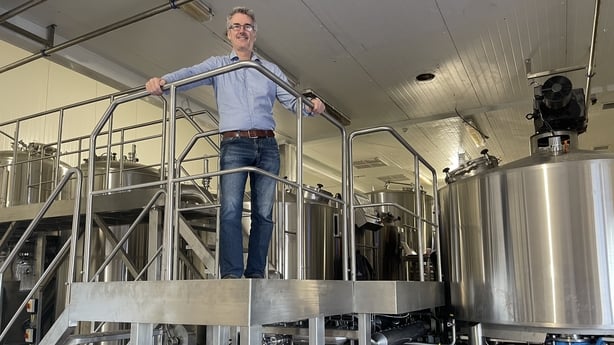€1.8m is been invested by around a dozen prominent Dublin and Cork publicans in a new brewery that will launch its first products today.
Changing Times will be offerings beers brewed in its new state-of-the-art Glasnevin brewery in 15 of the best known pubs in the capital and in Cork city, with more expected to be added soon.
Initially the brewery will be selling a lager named Daydreamer and a hazy pale ale called After Hours, but it is understood that a stout and other beers are in development, with the range expected to expand next year.
It is thought to be the first time that a group of Irish publicans have come together to launch their own brewing operation.
The brewing process is being overseen by Shane Long, the founder of the Franciscan Well brewery in Cork, which was sold to Molson Corrs over a decade ago.
Willie Aherne, one of the 12 co-founders of Changing Times Brewery, said it arose from a conversation that a number of publicans had been having for a few years, which crystallised a little over two years ago.
“We were good pals with Shane (Long) for years through his days with Franciscan Well, and we put it to him, what would you think? And we were kind of like, why not?,” said Mr Aherne, the owner of the Palace Bar on Fleet St in Dublin.
“So we did a bit of research, we ventured down to Cork and looked at a couple of small little breweries down there and looked at it and did some fact finding on it, and we put it to a few publicans in town who have good family houses in the city.
“And we said let’s go for it, let’s give it a go.”
Among the well-known pubs backing the venture are The Palace, The Long Hall, The Swan, The Bankers, Arthur Maynes in Donnybrook, Devitts, Doheny & Nesbitts, Sheehans, Lemon & Duke, The Bridge 1859, The Blackrock, The Bank, McSorleys, Darkey Kelly’s and The Ferryman.
Those behind the venture are playing down suggestions that they are trying to challenge the big established brewery owners, like Diageo and Heineken, but they do see a gap in the market.
“This is about looking after ourselves and our future, there are testing times at the moment,” said Mr Long.
“We view that we have to take the reins ourselves and really be ready to adapt to what is coming next.”
The new brewery, which employs nine people, is currently producing 100 kegs a week for the Dublin pubs, but is capable of producing up to 250 kegs a week, or over 10,000 a year.
It can also be easily expanded to brew 30,000 kegs per annum, the backers say.

Mr Long added that the new business sees itself as being a different because it is led by people who are on the front line and who see the customer on a daily basis.
“Over the years we’ve seen so many products come and go that we were told were the next big thing. We’re looking at things a little bit different to that. Everything is changing so quickly and we view that we need to adapt, we need to change quickly and hence the name Changing Times,” he said.
“So we are producing beers that we believe our customer is looking for.”
The new brewery launches into a challenging market, dominated by a small number of large established brewers and brands.
It also does so at a time when the cost of living remains a difficulty for many potential customers and when more drinkers are moving away from alcohol to zero-alcohol products.
“I think it is a very good idea. It is probably very timely because the craft beer phase has kind of come and gone and the bottle beer and so on,” said Damian O’Reilly, lecturer in retail and services management in TU Dublin.
“But to have a beer that is available in a pub, in an on-licence, is a new idea here in Ireland and I think it will do very well in competition with the big breweries.”
He calculated a pay back of between three and five years on the investment.
Mr O’Reilly said publicans are currently buying mainstream lagers at around €185 a keg, but it should be possible for a small brewery to produce its own for around €83 a keg.
“So there is definitely what we would call disintermediation, which is getting rid of the middle man, saving them around €100 a keg,” he estimated.
“The only problem I think they are going to have is maybe with supply…and the marketing.”
He added that while the market is dominated by the big players, there is definitely room for niche publicans and there is nobody in that market at the moment.
